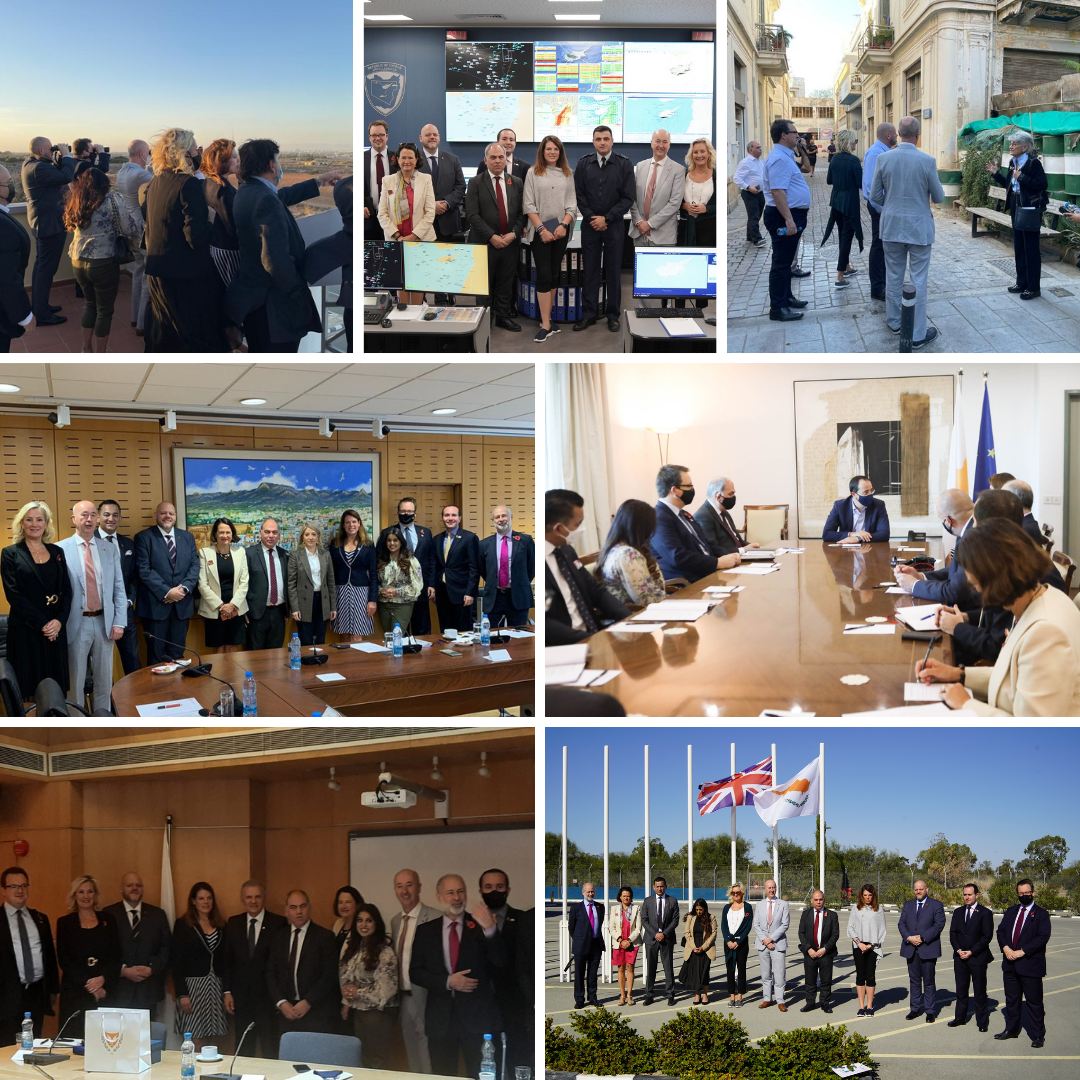TURKEY’S PARTITION AGENDA
Throughout the year, the President of the Republic of Cyprus, Nicos Anastasiades, repeatedly expressed his commitment and readiness to resume negotiations on the Cyprus issue from where they were left at the last major conference on Cyprus under the auspices of the UN in Crans Montana, Switzerland in July 2017. In stark contrast, President Erdogan and Turkish Cypriot leader Ersin Tatar have repeatedly rejected the longstanding United Nations framework for a solution, and instead are now publicly calling for an illegal ‘partition’ solution on the basis of two states or, so-called, ‘sovereign equality’. The agreed UN framework for a solution to the Cyprus issue outlines that the island must be reunified as a bi-zonal, bi-communal federation with political equality, as defined by the relevant UN Security Council resolutions.
In April 2021, the UN Secretary General convened an informal meeting on the Cyprus issue in Geneva in order “to determine whether common ground exists for the parties to negotiate a lasting solution to the Cyprus problem within a foreseeable horizon”. The informal talks were attended by President Anastasiades; Turkish Cypriot leader Tatar; the then Foreign Secretary of the UK, Dominic Raab; the Foreign Minister of Greece, Nikos Dendias; and the Foreign Minister of Turkey, Mevlut Cavusoglu.
At his press conference following the conclusion of the informal meeting, the UN Secretary General said that there is “not yet enough common ground for the resumption of negotiations”. He also outlined the positions of both the Greek Cypriot and Turkish Cypriot delegations:
- The Greek Cypriot position is to resume negotiations “to achieve a settlement based on a bi-zonal, bi-communal federation with political equality on the basis of relevant United Nations Security Council resolutions, the Joint Declaration of 2014, the existing body of work, the six elements I presented in Crans Montana, and in line with the EU acquis”
- The Turkish Cypriot position is that, “efforts to negotiate a bi-zonal, bi-communal federation have been exhausted” and that “the solution in their view should be based on two states cooperating with each other”
Since Geneva, Turkey has continued to insist on partition and “two states”. Along with its continuous provocative and aggressive behaviour, including in Varosha and the Cypriot EEZ, this has seriously undermined and continues to hamper prospects for the resumption of negotiations. British-Cypriots have reacted strongly in opposition to these partition demands, and continue to support a solution that reunifies Cyprus in line with the agreed UN framework. The National Federation of Cypriots has repeatedly expressed its condemnation that, instead of engaging constructively to find a solution within existing parameters, Turkey and the Turkish Cypriot leader are seeking to permanently divide the island and are choosing to advocate for a solution that is clearly contrary to UNSC resolutions or international law.
VIOLATION OF UNSC RESOLUTIONS ON VAROSI
In November 2020, President Erdogan visited the occupied areas of Cyprus and made clear his intention to illegally ‘open’ part of the fenced-off area of Varosi, the southern quarter of the occupied town of Famagusta. Two days later, the opening of part of the Famagusta beachfront was announced open to the public.
Then, on 20th July 2021, the anniversary of Turkey’s illegal invasion and occupation of Cyprus, President Erdogan and Turkish Cypriot leader Tatar announced that the second phase of the ‘opening of Varosi would “imminently” follow and in September 2021, the status of 3.5% of the fenced-off area of Varosi was changed.
These illegal actions were swiftly condemned by the UNSC in its Presidential Statements in October 2020 and July 2021 and referred to thereafter in its Resolutions on the renewal of UNFICYP’s mandate. In addition, this serious issue was addressed as running contrary to UNSC Resolutions in statements by the British Government, the US Government, the EU, and the UN Secretary General and by the Commonwealth Foreign Ministers. Opening any part of Varosi is a clear violation of international law and UNSC resolutions:
- UN Security Council resolution 550 (1984): “Considers attempts to settle any part of Varosha by people other than its inhabitants as inadmissible and calls for the transfer of that area to the administration of the United Nations”
- UN Security Council resolution 789 (1992): “with a view to the implementation of resolution 550 (1984), the area at present under the control of the United Nations Peace-keeping Force in Cyprus be extended to include Varosha”
- UN Security Council resolution 2561 (2021): “Recalls the status of Varosha as set out in relevant resolutions, including resolutions 550 (1984) and 789 (1992), and its Presidential Statement (S/PRST/2020/9), which expresses deep concern at developments in Varosha, and calls for the reversal of this course of action, and reaffirms that UNFICYP’s freedom of movement should be respected”.
As UNSC Resolutions clearly outline, Turkey should hand over control of Varosi to the United Nations Peace-keeping Force in Cyprus until a comprehensive solution to the Cyprus issue is reached, so that the area’s lawful inhabitants can return safely and not under conditions of Turkish military occupation. Instead, due to Turkey’s stance, the entire population of Varosi remain refugees, and tens of thousands of the town’s lawful inhabitants now reside in Britain. Turkey’s announcement concerning Varosi is a blatant violation of UN Security Council resolutions and seriously undermines prospects for the resumption of negotiations and a solution to the Cyprus issue.
DESTABILISATION OF THE EASTERN MEDITERRANEAN REGION BY TURKEY
In recent months, it has come to light that Turkey is operating a military drone base from Lefkoniko, a town in the occupied area of Cyprus. The drone base has already been used on multiple occasions to attack targets in Iraq and Libya. This illegal drone base further militarises a region with many challenges and, one could argue, represents a direct security threat to UK interests and its allies in the Eastern Mediterranean.
Furthermore, earlier this month, Turkey announced its intention to prevent American firm Exxon Mobil from fulfilling legally contracted and scheduled drilling in Block 5 of the Republic of Cyprus’ sovereign Exclusive Economic Zone (EEZ). In 2018, the Turkish Navy made similar statements in relation to Italian firm ENI, and then threatened ENI’s vessels with naval forces to prevent them from carrying out their work in Cyprus’ EEZ. Through these actions, regrettably, and not for the first time, Turkey shows a clear and blatant disregard for international law and still refuses to ratify the UN Convention on the Law of the Sea.
Turkey’s illegal actions seriously threaten further destabilising the Eastern Mediterranean.
APPG FOR CYPRUS DELEGATION VISITS ISLAND
A delegation of 10 MPs from the All-Party Parliamentary Group for Cyprus visited Cyprus in early November 2021, as guests of the House of Representatives of the Republic of Cyprus, to hear first-hand about the latest developments on the Cyprus issue and discuss opportunities for the strengthening UK-Cyprus relations. The delegation was led by Caroline Nokes MP and Bambos Charalambous MP and consisted of Geraint Davies MP, Caroline Dinenage MP, Fabian Hamilton MP, Mark Jenkinson MP, Gagan Mohindra MP, Anum Qaiser MP, Catherine West MP, and Mike Wood MP.
The delegation met with the President of the House of Representatives, Annita Demetriou MP, to discuss expanding inter-parliamentary collaboration between Parliament and the House of Representatives of the Republic of Cyprus.
They were also briefed on the latest developments on the Cyprus issue by the Minister of Foreign Affairs of Cyprus, Nikos Christodoulides; and the humanitarian issue of the missing persons of Cyprus by the Presidential Commissioner, Photis Photiou.
The APPG delegation also met with the British High Commissioner to the Republic of Cyprus, Stephen Lillie, the House of Representatives Standing Committee on Foreign and European Affairs and its Chair, Harris Georgiades MP; the mayors of the occupied towns of Famagusta, Kyrenia, Morphou, Akanthou, Lefkoniko, and Kythrea; and visited the Joint Rescue Joint Rescue Coordination Center (JRCC) in Larnaka for a briefing on Cyprus search and rescue activities and UK-Cyprus collaboration in this area.
Despite Turkey’s continued intransigence and President Erdogan’s growing authoritarianism, we sincerely hope that progress can be made towards a reunified Cyprus in 2022. As British-Cypriots we want to see a solution to the Cyprus issue, within the UN framework of a bi-zonal, bi-communal federation with political equality, that ends the occupation, reunifies the island and its people allows refugees to return to their homes. A solution that provides a brighter future for all Cypriots.
Whilst we acknowledge that the UK’s relationship with Turkey is longstanding and multi-faceted, where Turkey violates international law, it is vital that the British Government holds its leadership to account. The UK has led the global response to violations of international law across the world. Given the UK’s special obligations to Cyprus (as a Guarantor Power, a P5 Security Council member and the UNSC penholder on Cyprus), the UK must be willing to hold Turkey to account and ensure that Turkey upholds international law and returns to the negotiating table for a solution to the Cyprus issue that is in line with UN Security Council Resolutions.


